#yes i know its because grant has covid but its still its funny they kept the bit going
Explore tagged Tumblr posts
Text
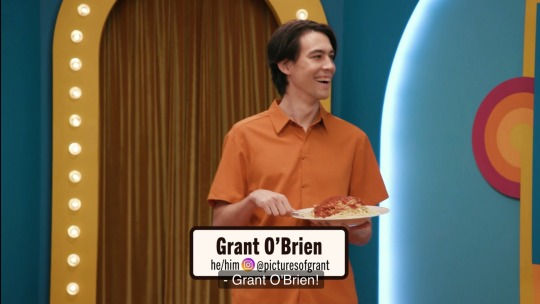
his ass is NOT grant o’brien!!!!
#dropout#game changer#zac oyama#aloe.etc#yes i know its because grant has covid but its still its funny they kept the bit going#100#200#hey why did this blow up so fast#300#400#GUYS CALM DOWN ITS NOT THAT FUNNY#500#you guys are on fire#600#700#what the fuck chat#800#900#1k#MY FIRST POST TO HIT 1K!! TYSM DROPOUT FANS!!!#2k#3k#4k#5k
6K notes
·
View notes
Photo
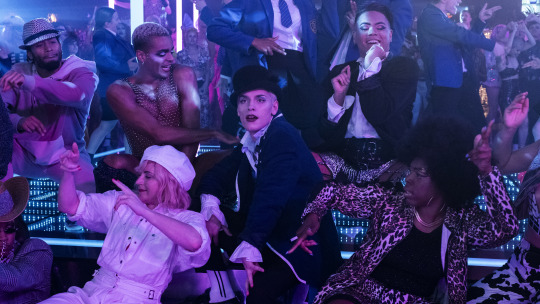
Wigging Out.
Choreographer and director Jonathan Butterell tells Gemma Gracewood about stepping behind the camera for Everybody’s Talking About Jamie, his love for Sheffield, and making sure queer history is kept alive. Richard E. Grant weighs in on tolerance and Thatcher.
Of 2021’s many conundrums, one for musical lovers is why the narratively problematic Dear Evan Hansen gets a TIFF premiere and theatrical release this month, while the joyously awaited Everybody’s Talking About Jamie went straight to Amazon Prime.
And yet, as the show’s lyrics go, life keeps you guessing, along came a blessing. There’s something about the film streaming onto young people’s home screens, with its moments of fourth-wall breaking where Jamie speaks straight to the viewer, that feels so important, given the content: a gay teen whose drag-queen destiny sits at odds with the less ambitious expectations of his working-class town.
Director and choreographer Jonathan Butterell, who also helmed the stage production (itself inspired by Jenny Popplewell’s 2011 BBC documentary, Jamie: Drag Queen at 16) agrees that the worldwide Amazon release is a very good silver lining. “I made the film for the cinema but, in 250 territories across the world, this is going to have a reach that—don’t get me wrong, cinema, cinema, cinema, collective experience, collective experience, collective experience—but it will get to people that it might not have got to before.
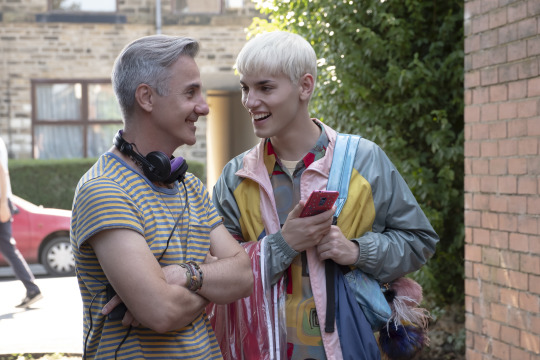
Jonathan Butterell on set with star Max Harwood, as Jamie.
“It feels as niche a story as you could possibly be. But also for me, I wanted it to feel like a universal story, that it didn’t matter where on any spectrum you found yourself, you could understand a young person wanting to take their place in the world freely, openly and safely.”
Everybody’s Talking About Jamie, with screenplay and lyrics by Tom MacRae and songs by Dan Gillespie Sells, sits neatly among a series of very specific feel-good British films about the working class experience, such as Billy Elliot, Kinky Boots and Pride. The film adds some historical weight to the story with a new song, ‘This Was Me’, which allows Jamie’s mentor, Hugo (played by Richard E. Grant), to take us into England’s recent past—the dark days of the discriminatory Section 28 laws, at a time when the HIV/AIDS epidemic was still ravaging the community.
Hugo’s drag persona Loco Chanelle (played in the flashback by the stage musical’s original Jamie—John McCrea from Cruella and God’s Own Country), sports a wig that looks suspiciously like the Iron Lady’s unmistakable head of hair. Grant confirms that was Hugo’s intention. “His heyday was in the 1980s, so as a ‘fuck you’ to Mrs Thatcher, what better than to be dressed up like that, at six-foot-eight, with a wig that could bring down the Taj Mahal!”
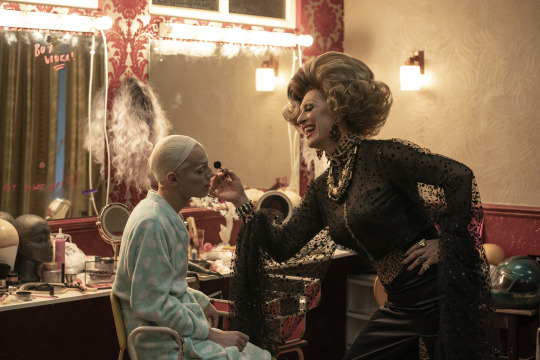
Richard E. Grant as Hugo, getting to work on Jamie’s contours.
In light of the current pandemic, and the fact that the 1967 legalization of homosexuality in Britain is only “an historical blink away”, Grant’s hope is for more tolerance in the world. “Maybe Covid gives people some sense of what that was like, but with Covid there’s not the prejudice against you, whereas AIDS, for the most part in my understanding, was [seen as] a ‘gay disease’, and there were many people across the globe who thought that this was, you know, whatever god they believe in, was their way of punishing something that they thought was unacceptable.
“The message of this movie is of inclusivity, diversity, and more than ever, tolerance. My god, we could do with a dose of that right now.”
Read on for our Q&A with Jonathan Butterell about the filmic influences behind Everybody’s Talking About Jamie.
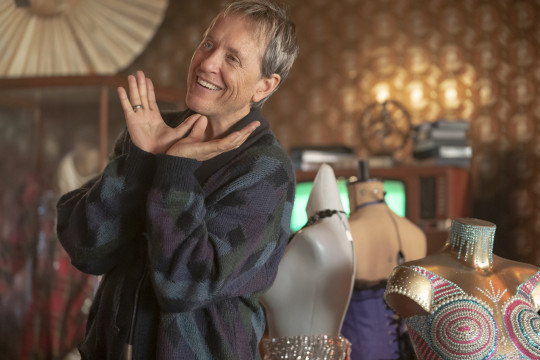
Hugo in a reverie, surrounded by his drag menagerie.
Can we talk about the new song, ‘This Was Me’, and the way you directed it in the film? It’s a show-stopper, with Richard E. Grant singing in that beautiful high register, and then moving into Holly Johnson’s singing, as you go back in time to show that deeply devastating and important history. Jonathan Butterell: It felt inevitable, the shift, and necessary. Myself, Dan Gillespie Sells, the composer, and Tom MacRae, the screenwriter, we created this piece together, the three of us, and it’s a film by the three of us. We lived through that time, we went on those marches. Actually, in one of those marches [shown in flashback], Dan’s mum—actual mum—is in a wheelchair, by a young boy who was holding a plaque saying “my mum’s a lesbian and I love her”.
That is Dan with his mum back in the day, and it all speaks to our stories and it moves me, I can see it’s moving you. It moves me because I lived through that time, and it was a complex time for a young person. It was a time that you felt you had to be empowered in order to fight, and you felt very vulnerable because of the need to fight. And because of that disease, because HIV was prevalent and we lost people—we lost close people—it was a difficult time. I wanted to make sure that that story kept being told and was passed on to the next generation.
It’s so important isn’t it, to walk into the future facing backwards? It still exists, that need to fight still exists. The conversation, yes, has moved on, has changed, but not for all people and not in all communities.
What would be your go-to movie musical song at a karaoke night? My goodness. There’d be so many.
I mean, is it going to be a Cabaret, a Chicago showstopper, or something more Mary Poppins, something from Rent? I think what I would go to, which is what I remember as a little boy, is Curly singing ‘Oh, What A Beautiful Mornin’. It’s such a kind of perfect, beautiful, simple song. That, and ‘The Lonely Goatherd’, because I just want to yodel. It would be epic. Trust me.
What is the best film featuring posing and why is it Paris Is Burning? It’s always Paris Is Burning. Back in the day, I was obsessed with Paris Is Burning, I was obsessed with that world. In fact, at one moment I even met [director] Jennie Livingston in trying to make a theater piece inspired by that. I lived in New York for eleven years and I met Willi Ninja. I just adored everything about him, and he would tell me stories. And again, it was so removed from the boy from Sheffield, I mean so far. That New York ballroom scene was so removed from my world, but I got it. Those two boys at the top of the film, I just wanted to be one of those boys who just hung out outside the club.
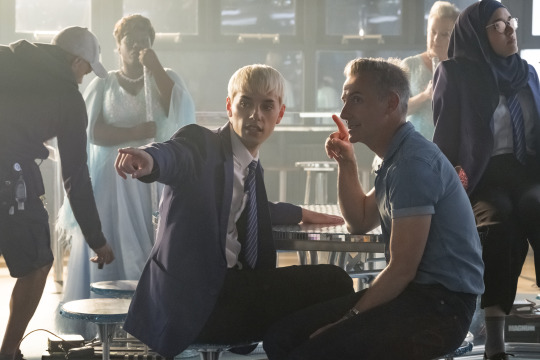
Harwood and Butterell on set, with Lauren Patel (right) as Jamie’s bestie Pritti Pasha.
What films did you and Tom and Dan look at to get a feeling for how to present the musical numbers? Actually, a lot of pop videos, from present day to past. There’s an homage, in the black-and-white sequences, to a little ‘Vogue’ Madonna moment. Pop is very central to me in this story because pop is what a working-class kid from a working-class community will be listening to. That’s in his phone, that’s in his ears. Not that many young people listen to much radio at this moment in time, but that’s what will be on Margaret’s radio, that’s what’s coming into the kitchen. And that was central to the storytelling for me.
Bob Fosse also really influenced me, and particularly All That Jazz and where his flights of imagination take him. I felt that was so appropriate for Jamie, and again in a very, very different way, but I could see how Jamie’s imagination could spark something so fantastical that would lead him to dance, lead him to walk on the most amazing catwalk, lead into being in the most fabulous, fabulous nightclub with the most amazing creatures you’ve ever met in your life.
For me personally, the film that most inspired me was Ken Loach’s Kes, because that is my community. Both the world in which Jamie exists—Parsons Cross council estate, is my world, is my community—and the world of that young boy, finding his place in the world with his kestrel friend, I remember identifying with that boy so clearly. He was very different from me, very different. But I got him, and I felt like Ken Loach got me through him.
Ken Loach made a few films set in Sheffield, didn’t he? But also, Sheffield is a setting and an influence on The Full Monty, The History Boys, Funny Cow and that brilliant Pulp documentary. So Jamie feels like a natural successor. It absolutely does. Sheffield’s where I grew up, it’s my hometown. Although I moved away from it, I always return. To have a chance to celebrate my community, and particularly that community in Parsons Cross council estate. If you’re in Sheffield and you’re in a taxi and you said, “Take me to Parsons Cross,” they’d say, “Well, I’ll drop you there, but I’m not staying.” Because again there’s a blinkered view of that community. And I know that community to be proud, glorious and beautiful.
And yes, that community, particularly through the ’80s, really suffered because some of that community would serve the steelworks and had three generations of unemployment, so they became disenfranchised because of that. But the community I grew up in, my Auntie Joan, who lived on that road, literally on that road, was a proud, working class, glorious woman who served chips at school.
Aside from Everybody’s Talking About Jamie, what would be the most important queer British cinematic story to you? (And how do you choose between My Beautiful Laundrette and God’s Own Country?!) You can’t. My Beautiful Laundrette influenced me so much because, one, Daniel Day Lewis was extraordinary in that film, and two, because of the cross-cultural aspect of it. I went, “I know this world”, because again I grew up in that world. And it affirmed something in me, which is the power and the radicalness of who I could be and what I could be.
With God’s Own Country, when I saw that film—and that was Francis’ first film, which I thought was extraordinary for a first-time filmmaker—I knew he knew that world from the inside, from the absolute inside. And I know what that rural community was like. I read that script, because we share agents, and I was blown away by it—again, because of the two cultures coming together.
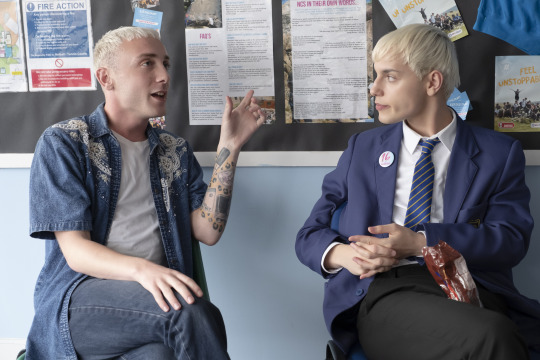
Jamie Campbell, the film’s real-life inspiration, with screen-Jamie Max Harwood.
Richard E. Grant’s character, Hugo, is such a pivotal mentor for Jamie. What did you need to hear from a mentor when you were sixteen? Don’t let yourself hold yourself back, because I think it was me who put some limitations on myself. And of course I came from a working-class community. I was a queer kid in a tough British comprehensive school. And did I experience tough times? Yes I did. And did I deal with those tough times? Yes I did. But the song that speaks to me mostly in this is ‘Wall in my Head’, in which Jamie takes some responsibility for the continuation of those thoughts, continuations of the sorts of shame, and that’s a sophisticated thing for a sixteen-year-old boy to tackle.
I also was lucky enough to have a mother like Margaret—and a dad like Margaret as well, just to be clear! And I remember my mum, at seventeen when I left home, just leaving a little note on my bed. It was quite a long letter. She said, Jonathan, you’ve probably chosen to walk a rocky path, but don’t stray from it, don’t steer away from it. That’s the path you've chosen, there may be rock-throwers along the way, but you’ll find your way through it. That stayed with me and I think that’s what resonates with me. And when I saw that documentary, Jamie: Drag Queen at 16, I felt that that sparked the need for me to tell that story.
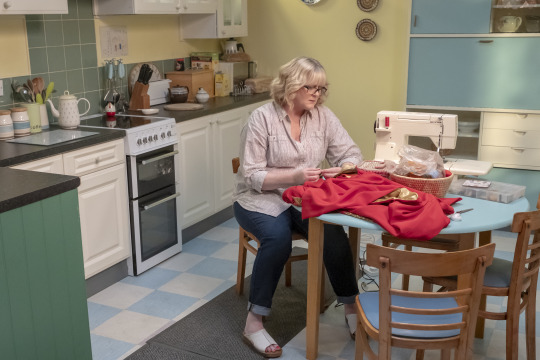
Sarah Lancashire as Jamie’s mum, Margaret New.
We need more mums and dads like Margaret, don’t we? We do, we do. And the wonderful thing is, Margaret Campbell will say it and I think Margaret New in the film will say it: she’s not a Saint, she’s an ordinary mum. And she has to play catch up and she doesn’t understand in many ways, and she gets things wrong and she overprotects. But she comes from one place and that is a mum’s love of her child and wanting them to take their place safely in the world and to be fully and totally themselves.
Related content
Eternal Alien’s list of films Made in Sheffield
Letterboxd’s Camp Showdown
Persephon’s list of films recommended by drag queens
Passion’s list of films mentioned by Jaymes Mansfield in her Drag Herstory YouTube series
Follow Gemma on Letterboxd
‘Everybody’s Talking About Jamie’ is streaming now on Amazon Prime Video.
#everybody's talking about jamie#max harwood#john mccrae#richard e. grant#sharon horgan#jonathan butterell#musicals#drag queen#queer film#lgbtqia cinema#british cinema
18 notes
·
View notes